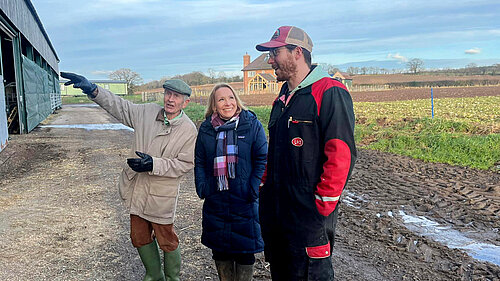Helen praises Shropshire dairy farm in supply chain debate

North Shropshire MP Helen Morgan opened her contribution to a Westminster Hall debate on the grocery supply chain by praising the work at Lower Lee dairy farm at Lee Brockhurst, and arguing for more support for the dairy industry.
The debate was over a petition supporting reforms to the grocery supply chain, which had received 985 signatures across the five Shropshire constituencies.
A survey last summer by the NFU found that 23% of dairy farmers were unsure if they would keep on producing into 2025, mostly caused by cost pressures and a lack of negotiating power over supermarket contracts.
The MP spoke on the ‘pincer’ the agricultural industry faces, with both higher costs of production and increased pressure from supermarkets to keep prices low.
Helen Morgan, MP for North Shropshire, told Westminster Hall, “Farming and food production are core to our economy, core to our landscape, and core to everything that impacts our communities in North Shropshire.
“It is important to recognise that the farming sector has found itself in the pincer over the cost-of-living, how it impacts their own business and how it impacts consumers.
“I would like to echo the calls that the petitioners have asked for, extending the code to intermediaries and producers, and to resource the adjudicator properly to make sure these provisions are being enforced.
“The farmer, who is often a small business, doesn’t have the teeth to shout up, and is in fear of losing their contract, must be properly protected.
“I would like to support our farmers and food producers, and I would really like to see the amount of profit throughout the supply chain managed so that we keep our farmers in business and don’t have to import from across the world.”
On her visit to Lower Lee Farm, the MP said, “I have the pleasure of visiting Lower Lee dairy farm in North Shropshire. It has cutting-edge technology, with a robot oriented milking and feeding programme, at the top end of animal welfare with cows and people not having to impact too much.
“It is really important business. Although it might be rural and look very pretty, the technology is cutting-edge and requires a lot of investment. There are growing borrowing costs for farmers on top of this whole supply chain issue as well, and so if we want these modern businesses to survive, we need to support them going forward.”
